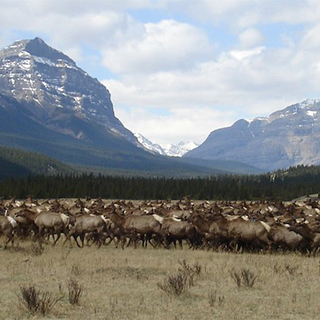Announcements
July 2021 – July 2022: Mark Hebblewhite will be on sabbatical near the amazing Las Cruces Research Station in Costa Rica.
May 2021: New paper in Science on the need for a Global Initiative on Ungulate Migration in partnership with the UN Convention on Migratory Species (CMS)
May 2020: Interactive Critical habitat loss map for Southern Mountain Woodland caribou from Eric Palms’ new paper in Conservation Science and Practice
February 2020: PhD student Eric Palm is featured on the Confluence podcast.
June 2019: Mark Hebblewhite discusses Pluie on the Wild Animals podcast.
January 2019: Mark Hebblewhite is recruiting a new PhD student for Fall 2019 to work on the Ya Ha Tinda long-term elk project. Find out more here (.pdf).
December 2018: Mark Hebblewhite visited SciShow to discuss ungulates, predator-prey relationships and his latest research.
August 2018: Our book chapter in Satellite Remote Sensing for Conservation Action on predicting mule deer harvests in real time is now published!
August 2018: See our recent letter in Science calling for USGS to keep LANDSAT data archives FREELY available for conservation science.
June 2018: Our NASA ABoVE: Animals on the Move project has a new web site.
April, 2018: Current and former Heb Lab members helped Vietnamese biologist, Minh Nguyen, learn about mule deer capture and handling using drive nets in Idaho to help the work of the Saola working group
April, 2018: Mark Hebblewhite recently joined the IUCN Species Survival Commission Deer Specialist Group
Jan., 2018: Mark Hebblewhite is co-author of the recent paper "Moving in the Anthropocene: Global reductions in terrestrial mammalian movements" in Science Jan 2018.
Dec., 2017: We've updated our Ya Ha Tinda Long-Term Elk Monitoring project web site. Check it out!
Nov., 2017: Mark Hebblewhite presentation "Ecology and Conservation of Mule Deer in Idaho: Management Strategies for Restoring Populations." (video)
Nov., 2017: Wildlife Conservation Society-Canada featured PhD candidate Eric Palm's research on lichen abundance in their annual report "Flying High for Wildlife Conservation."
Sept. 2017: Andrew Jakes, who just wrapped a post-doctoral fellowship with the lab, is featured in this episode of the Right to Roam podcast, "Pronghorn, Speed Goats, Antelope...Oh My!"
Sept. 2017: SCI Foundation and Hunter Legacy 100 Fund supported the Ya Ha Tinda Elk Project to add a bull elk population study. This will be the first bull elk study ever in an ecosystem where recovering predators, including wolves, cougars, and grizzly bears, along with hunter harvest all influence survival.
Video: Population density - a new method using remote cameras and radio collars The Applied Ecologist's Blog, by Jesse Whittington
May 2017: PhD student Eric Palm received the NASA Earth and Space Fellowship - $45,000 to study animal movement using ecosystem-scale models for caribou
May 2017: PhD student Eric Palm received a Franke WBIO graduate fellowship from the W.A. Franke College of Forestry & Conservation
March 2017: Former PhD student Robin Steenweg's paper won best scientific paper of the year from the Alberta Chapter of The Wildlife Society,
Oct. 12, 2016: Opinion: Alberta's Caribou Conservation Plan is a Visionary First Step Edmonton Journal Mark Hebblewhite's op-ed about Alberta's new caribou conservation strategy
Aug. 14, 2016: After Roaring Lion Fire Cools, Elk May See Home Improvement Missoulian
Aug. 5, 2016: Hello, bear! Remote cameras effectively monitoring grizzly bears in mountain parks Calgary Herald
July 2016: To save caribou, Alberta wants to fence them in
June 2016: Alberta plans to add 1.8 million hectares of protected range for Woodland caribou Calgary Herald
March 11, 2016: The Unnatural Kingdom - if technology helps us save the wilderness, will it still be wild? New York Times Sunday Review
Wildlife Biology in the 21st Century, Mongabay
$1.6 million NASA Arctic-Boreal Vulnerability Assessment (ABoVE) project, "Animals on the Move" funded with PI Natalie Boelman, Columbia University – read more here
